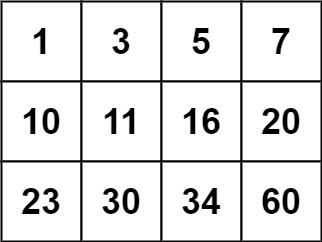You are given an m x n integer matrix matrix with the following two properties:
- Each row is sorted in non-decreasing order.
- The first integer of each row is greater than the last integer of the previous row.
Given an integer target, return true if target is in matrix or false otherwise.
You must write a solution in O(log(m * n)) time complexity.
Example 1:
Input: matrix = [[1,3,5,7],[10,11,16,20],[23,30,34,60]], target = 3 Output: true
Example 2:
Input: matrix = [[1,3,5,7],[10,11,16,20],[23,30,34,60]], target = 13 Output: false
m == matrix.lengthn == matrix[i].length1 <= m, n <= 100-104 <= matrix[i][j], target <= 104
class Solution:
def searchMatrix(self, matrix: List[List[int]], target: int) -> bool:
if not matrix or not matrix[0]:
return False
rows, cols = len(matrix), len(matrix[0])
left, right = 0, rows * cols - 1
while left <= right:
mid = (left + right) // 2
mid_value = matrix[mid // cols][mid % cols] # Convert 1D index to 2D indices
if mid_value == target:
return True
elif mid_value < target:
left = mid + 1
else:
right = mid - 1
return FalseThe time complexity of this algorithm is O(log(m * n)) since it is essentially a binary search. The space complexity is O(1), as we are not using any additional data structures that grow with the size of the input.

